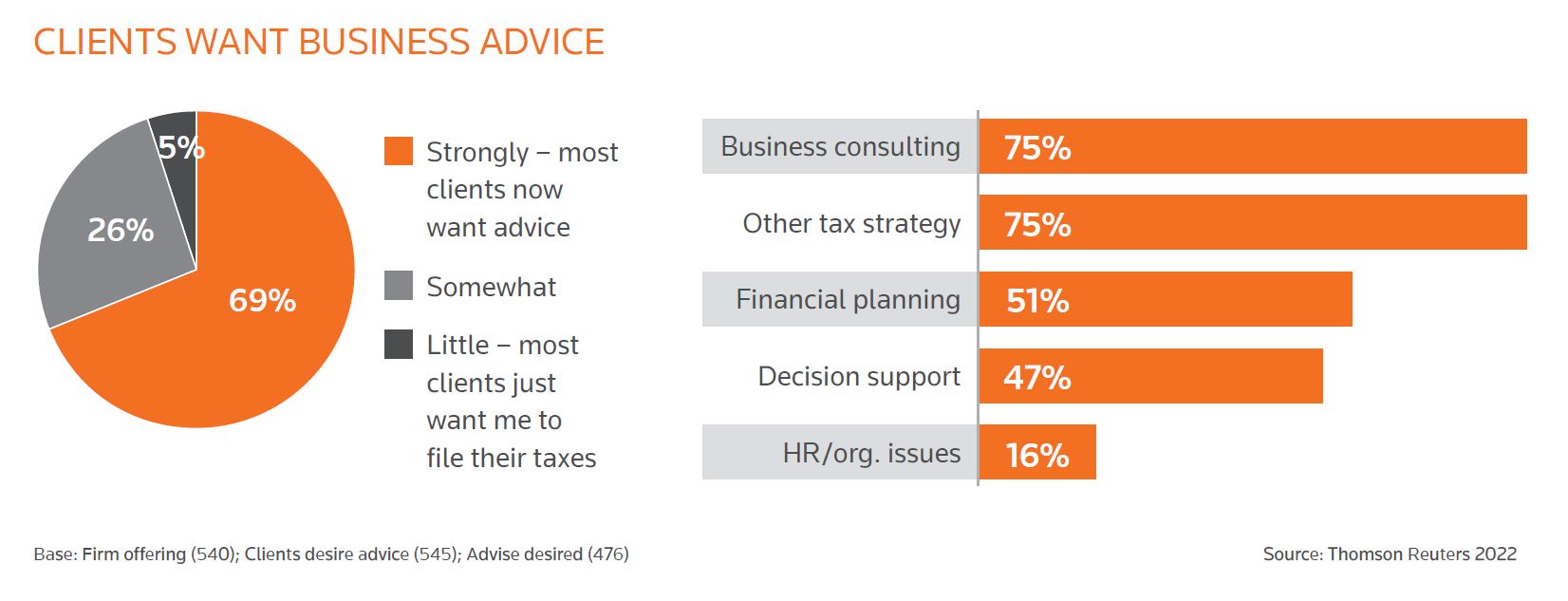This is the first installment in a three-part series about how small and midsize accounting firms can overcome the challenges faced by creating a business advisory service and offering it to clients
The leaders of nearly all small to midsize accounting firms — 95% — said their clients want more business advisory services “to help them navigate the unfamiliar territory confronting all businesses now,” according to a recent survey.
However, only about one-half of the accounting firms participating in the survey offer such services — such as financial planning or business decision-making guidance — and stick mostly to offering tax return preparation, bookkeeping, and other basic compliance work. Further, less than 40% of firms said they offer auditing services and less than 30% offer international tax advice, according to the recently published 2022 Tax Professionals Report from the Thomson Reuters Institute, which had gathered information from hundreds of accounting firms around the world, most of them small to midsize firms.
“Data shows that businesses of all sizes are in need of a financial helping hand from the people who know their numbers best,” the report stated. “Opportunities abound for those firms that are willing to take on a more active business advisory role for their current and future clients.”

Most large accounting firms offer a range of business advisory services, and the survey makes it clear that virtually all small and midsize firms know this is a sound way to expand their services, fill a client need, and grow their revenues. And yet they’re hesitant to seize this opportunity. Why?
“Some firms are clearly moving down this path and making progress,” says Will Hill, a Senior Product Manager at Thomson Reuters. “And others are acknowledging that they need to but haven’t pulled the trigger.”
Hill also has a few ideas about what’s holding back many of these small and midsize firms:
Fear
“I think there are times when firm owners need to name their enemy, to name their fear, and acknowledge that’s holding them back,” Hill says. “Then they’ll be able to craft a plan and push forward.”
The Tax Professionals Report offered a similar conclusion: “Past surveys have suggested that many firms and their tax advisors already have the knowledge and experience necessary to be effective business advisors, but what they lack is confidence, mainly in their own communication skills and the ultimate value of their advice,” the report explains. “But confidence is a skill that can be learned, like any other.”
Mindset
It can be challenging for accountants to transition from completing financial statements and tax returns — assembling facts to document what happened in the past — to providing guidance on a business’s best path for the future.
“It certainly can be a tough mental bridge to cross,” Hill agrees, adding that there are two main factors that firms should keep in mind:
-
-
- The business advice being offered is directly informed by the client’s financial realities, which the accounting firm understands intimately. This advice could addresses topics such as the most advantageous entity structure, when and how to add staff, and ways to best bolster cash flow; and
- Advisory engagements need to focus on a specific, tangible value-adding idea. One example could be to create and execute a plan to ensure that a chronically under-capitalized company has enough money set aside to weather rough patches.
-
“It’s just completely recasting what you think of as the objective, what the end zone is,” Hill adds. “It’s not a tax form — it might be the client having six months of expenses in the bank.”
Perfectionism
Accounting firms may not make the leap to advisory services because they believe they need an entire business plan and service offering nailed down first, Hill suggests. That is a positive instinct based on the desire to provide exemplary service — and it comes from the right place — but it’s usually better to start slow, take baby steps, and learn and adapt as you go.

“They feel like they’ve got to do this huge list of things, and they often make it bigger than it needs to be,” he says. “And the reality is, we just need to make a little progress.”
Start by identifying times when a client asked for guidance and the firm provided it informally. Then, when you have three or more clients asking for help with the same issue it will be easier to provide that advice. These clients are likely not alone in needing a solution to this problem, so if the firm creates a plan or checklist for solving the problem and shares it with other businesses, that would make good sense. This can be the first simple step in moving toward an advisory/consulting model, Hill notes.
All-or-nothing thinking
A variation on perfectionism, this occurs when an accounting firm believes it must implement advisory business services for all its clients. Instead, they should continue providing basic compliance services to most clients while crafting a limited slate of advisory services for a handful of clients that are ready for such offerings. This is a low-risk way to pilot the concept and create a new revenue stream.
An uncertain journey
It’s difficult to forge a path when the direction is uncertain, and the endpoint is unclear — but it’s required in order to transition to an advisory model. The key is an entrepreneurial mindset. Listen to the market, identify and seize the immediate opportunity, re-assess the landscape, and determine the next step. “You need to be comfortable with that sort of fluidity, that ongoing process,” Hill says. “See where it takes you and determine what the next steps are once you get there.”
Relentless change
Hill acknowledges that it’s been a rough few years for accounting firms to tackle new initiatives, because they’ve been overwhelmed by change, including managing the impact of the COVID-19 pandemic on their operations and their clients’ businesses as well as navigating the implications of the Tax Cuts & Jobs Act, the Paycheck Protection Program, and the Employee Retention Credit.
Yet, for the first time in years, there is no major tax legislation around the corner, Hill notes, and many small to midsize accounting firms have a moment to catch their breath. The Tax Professionals Report, however, makes it clear that businesses want advisory services now, so firms shouldn’t wait too long to seize the opportunity.
Next: We will examine some small steps that accounting firms can take to implement advisory services on a manageable scale.




